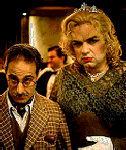
Watching Stanley Tucci act is like reading a universal truth: you recognize something good any old time, real and acceptable as needed, comfortable in its own skin. I can easily imagine Tucci in The General (1927) fruitlessly pursuing Keaton, in Casablanca (1942) shaking cocktails for Bogart behind the bar, imposing on Jack Lemmon in The Apartment (1960), even leaning into the microphone to sternly inquire into Al Pacino's ties to organized crime in The Godfather (1972). His career reflects this universality, although early on he seemed mostly to fit snugly into pinstripes; he pops up as Lucky Luciano in Billy Bathgate(1991), and in the early '90s seemed to play swarthy or oily--a tendency he transcended with Big Night (1996), which he co-directed, -wrote, and also -starred in with another "ethnic type," Tony Shaloub, playing an Italian restauranteur with a underappreciated chef brother in Atlantic City circa 1955. It is a small and perfect world, dominated by food, loss, and love. I am so attached to this movie that I fear I am suspicious of anyone who doesn't have at least some affection for it. Like Kevin Spacey, Tucci brings a precision to his performances, an almost clipped reserve that opens doors into the insecurities and hopes of his characters.
Tucci's strengths are evident in Big Night, but the movie I can't stay away from is The Imposters (1998), in large part an homage to the Marx Brothers by way of Mel Brooks. Tucci and Oliver Platt play out-of-work actors who flee the misguided ire of another, more successful, actor (played by Alfred Molina) to a passenger ship--on which, of course, is Molina's Sir Jeremy Burtom. There we meet an almost-too-crowded collection: con artists, a Sheik, a dowager and her spinsterish daughter, a saboteur, a suicidal lounge singer, a "veiled queen"--that's what it says in the credits--and a variety of oddball crewmembers. The cast is a who's-who of indie films--Tony Shaloub again, with Lili Taylor, Steve Buscemi, Campbell Scott, Billy Connolly, Hope Davis, and the forever-amber Isabella Rossellini--and the set used for the ship has a cozy artificiality that invites us into the joke. All in all, a wide-eyed romp that sometimes stumbles, but always manages a Pee-Wee-Herman-like, "I meant to do that," and scrambles on.
But The Imposters' deepest value lies in the way it both interrogates and celebrates the idea of performance. From its opening scene, in which Arthur (Tucci) and Maurice (Platt) sit opposite one another and perform acting exercises, silently expressing emotions on command ("No hands," Platt is warned)--we are immersed in lives sustained by performance. As Lynne Anne Blom and L. Tarin Chaplin remind us in their 1989 book on dance improvisation, The Moment of Movement, "the senses are not verbal." And gosh, wasn't it just a few years earlier that Aristotle pointed out that action reveals character? In a pivotal moment in The Imposters, Tucci and Platt agree, "Now is the time to act," setting in motion a furious round of saves, near-misses, couplings and uncouplings, and revelations of the movie's central conceit: We reveal ourselves via the disguises we adopt. These double-plus entendres are often punctuated by musical interludes, the most emblematic of which are two renditions of "Parlez-Moi D'Amour," one surreal (Platt and Tucci disguised beneath harem veils execute a pas de trois with the Sheik as the Victrola plays Edith Piaf's immortal version), the other sweetly yearning (Hope Davis' lonelyheart serenades Steve Buscemi's suicidal singer, Happy Franks). I mention the music because song of one kind or another floats and flings itself around this movie, underlining the need for movement, performance, pretense, as a release from inertia and a relief from despair. At the end, like the Blazing Saddles fistfight that extends through the Warner Bros. backlot, while the credits roll the cast of The Imposters dances in Groucho-esque abandon through the set--then off it, past the cameras and crew, and across the soundstage.
The Imposters always makes me happy. Case in point: Oliver Platt has been running around in drag, attracting the attention of the aggressively sexually ambiguous Mr. Sparks (Billy Connolly)--shades of Some Like It Hot--and finally confronts Sparks with the truth, tearing off his wig and, Jack-Lemmon-like, shouting, "I'm a man!" to which Sparks lustily cries, "And so am I!" It is a line I can't stop finding hilarious, if only because it not only reveals the toothy-grin core of Sparks' character but also speaks to The Imposters' general air of whoopsy-daisy--or is it topsy-turvy? No matter, for while some moments seem a bit forced, Tucci still runs Arthur gleefully through the movie, befuddled but eager, Platt exploits Maurice's quirky uncertainties and sporadic commitments, and everyone, even the stop-or-I'll-jump Happy Franks, has fun, including me.
1 comment:
Thanks for the great recommendation! I also very much enjoyed your thoughtful commentary on Eraserhead.
Post a Comment